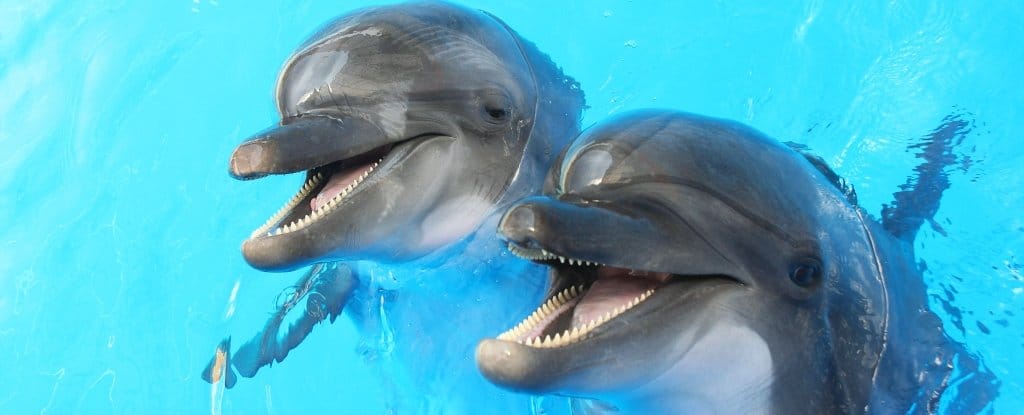(Michelle Starr) Many comparisons have been made between humans and dolphins, those sleek mammals of the sea. Now scientists have found another point of similarity between us and our cetacean cousins: Like us, dolphins make friends based on mutual interests.
Related Victory! Canada Officially Bans Dolphin and Whale Captivity
by Michelle Starr, June 16th, 2019
In the case of the Indo-Pacific bottlenose dolphin (Tursiops aduncus) specifically, individuals tend to hang out with others that use the same tool for foraging.
That tool is a sea sponge. In the waters of Shark Bay off the coast of Western Australia, the dolphins have been observed using sponges like a thimble, to protect their beaks as they forage, allowing them to access food in deeper water channels than non-sponging dolphins.
This is the only place in the world this behaviour has been seen, and it’s been well documented in females, who adopt sponging along matrilineal lines, passing the trick down from mother to daughter. They also tend to associate with other spongers.
Males seem to use the technique much less. Scientists thought this might be because sponging – which is time consuming – was possibly taking time away from adult male-specific behaviours, such as making friends with other male dolphins.
But, after an extensive study on sponge use among male Shark Bay dolphins, researchers have discovered that there could be a benefit, and it seems to be a social one after all.
“Foraging with a sponge is a time-consuming and largely solitary activity so it was long thought incompatible with the needs of male dolphins in Shark Bay – to invest time in forming close alliances with other males,” said biologist Simon Allen of the University of Bristol.
Buy Book Deep Thinkers: Inside the Minds of Whales, Dolphins, and Porpoises
“This study suggests that, like their female counterparts and indeed like humans, male dolphins form social bonds based on shared interests.”
The team analysed a whole bunch of data collected on 124 male dolphins in Shark Bay from 2007 to 2015, including photographic, genetic and behavioural. For the purposes of the study, they identified 37 dolphins within that group that were conclusively adult spongers or non-spongers – 13 of the former, and 24 of the latter.
They found that the spongers tended to spend more time with other spongers than with non-spongers – and this relationship could not be easily attributed to other factors. For example, how closely two male dolphins were related seemed to have no significant impact on their hanging-out time.
Their shared interest in sponges, however, did. Although spongers spent more time alone, when they were seen with other males, more often than not it would be with another sponger.
This suggests that the costs associated with sponging for male dolphins may be offset by the benefits of a strong dolphin bromance.
“Male dolphins in Shark Bay exhibit a fascinating social system of nested alliance formation,” explained marine biologist Manuela Bizzozzero of the University of Zurich.
“These strong bonds between males can last for decades and are critical to each male’s mating success. We were very excited to discover alliances of spongers, dolphins forming close friendships with others with similar traits.”
The research is due to be published in Proceedings of the Royal Society B.
Stillness in the Storm Editor: Why did we post this?
Consciousness is one of the most mysterious phenomena of all time. Scientists, philosophers, and mystics have been searching for the answer to the question, What is Consciousness? for most of human history. In modern times, the spiritual origins of consciousness are being replaced with a materialistic view, that awareness emerges as an additive property of electrical impulses in living things. Despite the fact this theory is assumed to be true, any self-respecting psychologist will tell you we have no idea what consciousness really is. The preceding article discusses consciousness, some of its properties, and possible origins. This is helpful to contemplate because, in the act of trying to understand the mysteries of consciousness, you develop critical thinking skills and stimulate your philosophic muscles, both which are immensely important for almost everything we do in life. Additionally, you’ll develop abstract thinking skills, the ability to explore intangible realities that govern material realms. With the power of an active mind capable of navigating the realities of consciousness, great leaps in personal attainment can be made along with preparing you for the Great Work of making this world a better place.
– Justin
Not sure how to make sense of this? Want to learn how to discern like a pro? Read this essential guide to discernment, analysis of claims, and understanding the truth in a world of deception: 4 Key Steps of Discernment – Advanced Truth-Seeking Tools.
Stillness in the Storm Editor’s note: Did you find a spelling error or grammar mistake? Send an email to [email protected], with the error and suggested correction, along with the headline and url. Do you think this article needs an update? Or do you just have some feedback? Send us an email at [email protected]. Thank you for reading.
Source:
https://www.sciencealert.com/dolphins-forge-friendships-over-their-shared-interests

Leave a Reply